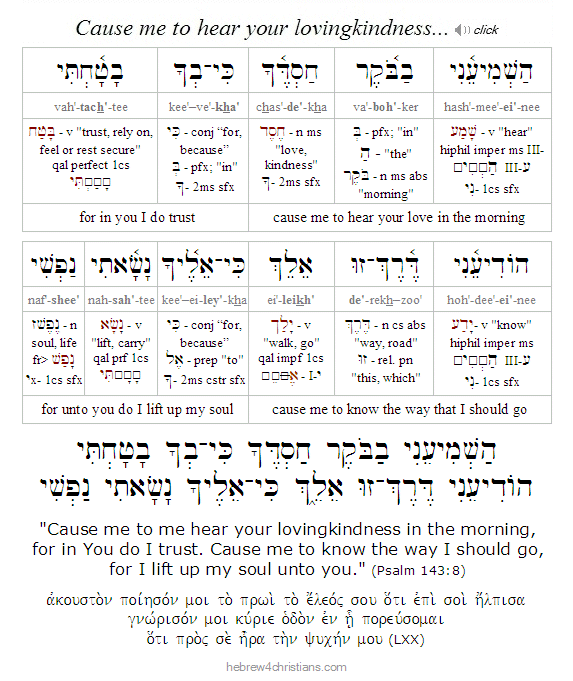|
It is customary to refer to "books" of the Hebrew Bible according to their initial word(s). For example, the first book of the Torah is called Bereshit ("in the beginning"). When the Hebrew Scriptures were later translated into Koine Greek (c. 3rd-2nd century BC), the names of individual books were assigned based on interpretations of the ancient sages. Therefore the Septuagint (i.e., the ancient Greek translation) named the first book of the Torah Γένεσις ("birth" or "origin"), which later made its way into English (and other languages) via Latin as the word "Genesis."
It's important to note that the names of the books were "coined" by the Greek translators and are not part of the original texts of Scripture themselves.... Therefore the "Book of Leviticus" is a transliteration of the Greek phrase βιβλίον το Λευιτικόν, ("book of the Levites"), though in a Torah scroll it was simply identified according to its first significant word: Vayikra (וַיִּקְרָא - "and he called"); likewise, the "Book of Numbers" comes from the Greek word Ἀριθμοί ("numbers"), though in a Torah scroll it was identified by the keyword Bamidbar (בְּמִדְבַּר - "in the wilderness"); and so on for the rest of the seforim (books) of the Hebrew Bible. In Jewish tradition it is customary to refer to the names of the books in Hebrew (not Greek, etc.): Bereshit (for Genesis), Shemot (for Exodus), Vayikra (for Leviticus), and so on.
Bamidbar means "in the wilderness" and is the name associated with the fourth book of the Torah scroll. Since several censuses are recorded in it, the sages sometimes called the book sefer ha-pekudim (the book of counting), so named because of the phrase bemispar shemot (בְּמִסְפַּר שֵׁמוֹת) - "they were counted according to their names" (Num. 1:2). The sages stress that unlike earlier censuses (e.g., Exod. 30:12-14), this one was personal because it was based on individual names (shemot). Accordingly, and because the idea of personal counting was considered central, the book was translated in the Septuagint using the Greek word Ἀριθμοί ("numbers") as its title. As Yeshua said, even the very hairs on our heads are all numbered (Matt. 10:30).
The Tribe of Levi was the smallest of the tribes of Israel (both before and after the sin of the Golden Calf). According to midrash, this was because the Levites were faithful to God while in Egypt and therefore did not come under the special blessing of God to supernaturally multiply those who persecuted the tribes (Exod. 1:12). The LORD delights in exalting the lesser things; the lowly are regarded as chief.... Even when going out of Egypt, the LORD preserved a remnant for the sake of His Name.
The book recounts Israel's adventures in the wilderness (מִדְבָּר) from their second year of the Exodus until the 40th year. In general, it details how the tribes of Israel were counted and meticulously arranged into military camp formation around the Mishkan (tabernacle).
 |
Led by the Shekhinah (שְׁכִינָה) cloud by day and the pillar of fire by night, at first the Jews were en route to the Promised Land - the land of Canaan - which the LORD swore to give to Abraham and his descendants forever. However, the people rebelled (i.e., their complicity in the "Sin of the Spies") and were therefore condemned to wander for 40 years in the desert. This 40 year period is often thought of as a time of punishment, though it was also a time of refinement for the nation, and it was during this time that God demonstrated great love for Israel by feeding the people with manna, giving them water from rock (i.e., the so-called Well of Miriam), protecting them with the Clouds of Glory, instructing them through the teaching of Moses, and so on. God loves his people -- even when they are faithless -- and his punishments are ultimately healing and redemptive.
The Great Assembly (Hebrew: כְּנֶסֶת הַגְּדוֹלָה) decreed that parashat Bamidbar would be read on the Sabbath before the festival of Shavuot "so that the year and its curses will be terminated." This phrase refers to the "Great Rebuke" - called the Tochachah (תּוֹכָחָה) - that was delivered in the previous Torah reading (i.e., Bechukotai, the last portion of Vayikra). Recall that this portion used 11 verses to describe the blessings for obedience (i.e., "if you follow my laws...") but used three times as many (33 verses) to describe the curses for disobedience to the Sinai covenant ("but this is what will happen if you do not listen to me"). Since the curses (קְלַלוֹת) included the destruction of the Temple and the great exile (galut) from the land, and since Shavuot commemorates the giving of the Torah at Sinai, it was thought that recommitting to the Sinai covenant during Shavuot would "reverse the curse" and cause blessing to come upon Israel. This explains why Shavuot was regarded as time for Israel to recommit themselves to talmud Torah (the study of Torah) and to renew the decision to live as a Jew. And this also explains why the Ruach HaKodesh (Holy Spirit) was given to Yeshua's disciples precisely during this time after His resurrection. Instead of recommiting to Sinai we were given evidence that the New Covenant was beginning to be established at Zion....
The Hebrew word midbar ("wilderness") shares the same root (דבר) as davar, which means "word." The desert (word) of Sinai is the word of humility (ענוה). When God spoke the Torah to Moses (mattan Torah), it was from a nondescript mountain (Mount Sinai) -- a place of emptiness, brokenness and need. Indeed, another word for Sinai is Chorev (חרֵב), a word that refers to the dryness and desolation. That is the starting point -- not the lush places of future promise. We receive Torah bamidbar because we can only hear God's davar in a place of humility and inner quiet. God brings us to an arid place -- inhospitable, and dangerous -- to reveal our need for Him. This is a necessary excursion to prepare us to look for the greater hope of Zion. The giving of the law was meant to offer gracious discipline until the Mashiach would come (Gal. 3:19, 24-25). Yeshua is the Greater Hope, the One who delivers us from the curse of Sinai to bring us to Zion (Gal. 3:10). We enter into the realm of promise when we personally put our trust in God's love for us -- not by redoubling our efforts to obtain favor through adherence the terms given at Sinai (Heb. 8:13). "For the Torah made nothing perfect; but on the other hand, a better hope is introduced, and that is how we draw near to God" (Heb. 7:19).
Hebrew Lesson
Psalm 143:8 Hebrew reading:
|




